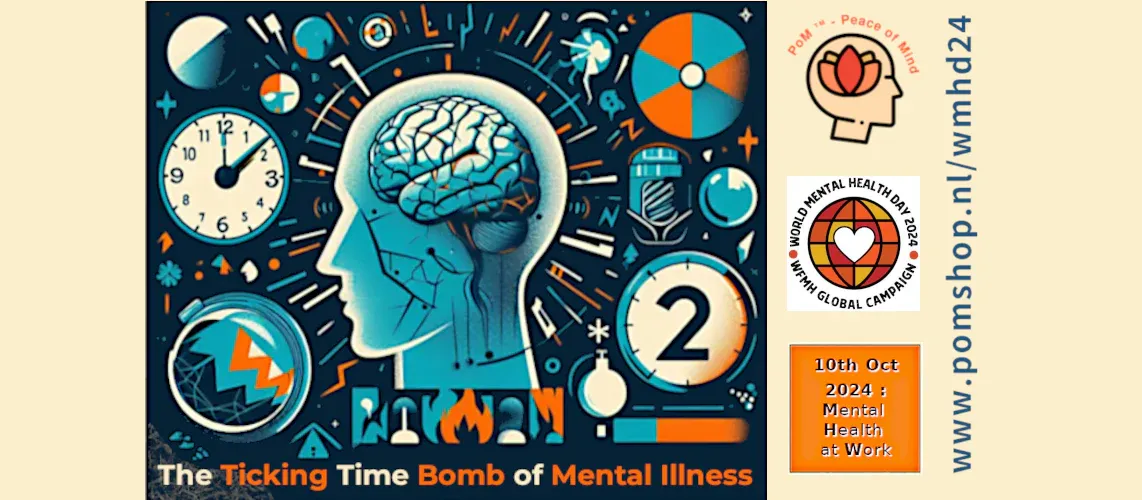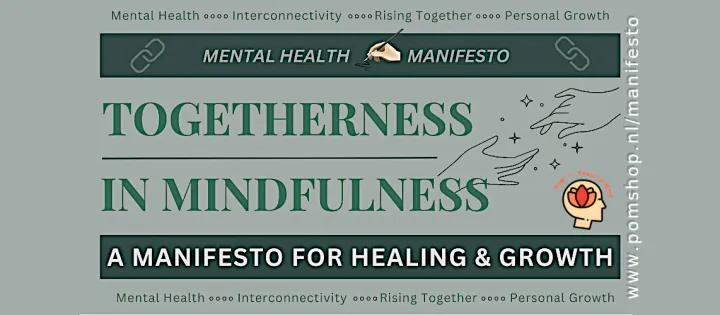Mindfulness as a Path to Healing: Addressing the Global Mental Health Crisis (part 2 of World Mental Health Day 2024, 10th October)

part 2 ... read part 1 here:
World Mental Health Day is October 10th (Introduction)

DigitPaxM-10102024. - In today’s fast-paced world, mental health struggles are becoming increasingly prevalent, affecting individuals across all demographics. Despite significant progress in understanding mental health, the global statistics reveal a concerning picture—one that underscores the need for holistic, preventive approaches like mindfulness.
This article published on the World Mental Health Day 2024 dives into the current state of mental health worldwide and explores how mindfulness can serve as a vital tool for both prevention and treatment.
Global Mental Health Trends: The Scale of the Crisis
Mental health disorders are now recognized as a major public health challenge, affecting millions globally. In 2019, depressive and anxiety disorders alone accounted for over 970 million cases worldwide, with substance use disorders rising sharply. Alcohol use disorders now affect over 108 million people, while drug use disorders, primarily driven by opioid addiction, surpass 56 million cases globally. The prevalence of mental health disorders is staggering, with an estimated one in every two people developing a mental health disorder in their lifetime.
The widespread impact of mental disorders is not just limited to the individual. It poses serious risks to society, contributing to high mortality rates and suicide, particularly in low- and middle-income countries, where mental health services are limited.
Even more concerning is the toll on social and emotional well-being. Globally, 30% of individuals report struggling with their "Social Self", and 27% report challenges with "Mood & Outlook". - These issues are often more prevalent than struggles with cognition or motivation, signalling the widespread emotional distress affecting people across the globe.
PoM Podcast "Global Mental Health in Crisis: Facts, Impacts, and Solutions"
- A Deep Dive into the Mental Health Emergency and What We Can Do About It
On World Mental Health Day 2024, we confront the alarming state of global mental health. With over 970 million people struggling with mental health disorders like depression and anxiety, the crisis is undeniable. This podcast breaks down hard-hitting facts, explores the devastating economic and social impacts of untreated mental health issues, and highlights proven strategies for recovery.
Don't miss this enlightening conversation! Listen into now ...
Produced & Delivered by Digit PaxMentis
Listen to our new Podcast @ Youtube
!! premiere date: 10th Oct 2024 - 12:00 pm CET (Central European Time) !!

As with all the podcast formats we offer the "listen on-demand" version as MP4with with Karaoke-style subtitles (for people with disabilities). - YouMP4 get the full 1:1 script as free PDF download from our archive ... https://www.pomshop.nl/transcripts

The Hidden Costs of Untreated Mental Health
Untreated mental health issues have far-reaching consequences beyond the personal toll they take on individuals. On a global scale, depression and anxiety alone cost the economy an estimated $1 trillion annually due to lost productivity. These conditions also result in the loss of 12 billion workdays every year, making mental health disorders one of the leading causes of long-term sickness absence. In Australia, for example, job loss has been directly linked to deteriorating mental health, further highlighting the cascading effects of untreated conditions.
The economic and social burden of untreated mental health problems is immense, and many individuals suffer in silence, facing a daily battle with sleeplessness, anxiety, and emotional turmoil. Unfortunately, it often takes reaching a breaking point—whether through job loss, addiction, or severe mental distress—before people seek help.
Mindfulness and Physical Activity: Proven Treatment Methods
While mental health treatment often involves therapy and medication, there is growing evidence supporting the effectiveness of physical and holistic interventions. For instance, exercise has shown moderate success in reducing symptoms of depression, often recommended in clinical guidelines across the UK, the US, and Australia. More intense physical activity yields even better results, helping individuals manage their mental health in conjunction with traditional methods like Cognitive Behavioral Therapy (CBT).
One of the most promising methods is yoga, which has been found to reduce anxiety, lower stress hormone secretion, and improve heart rate variability. These benefits align with the core principles of mindfulness, emphasizing the power of the mind-body connection in managing mental health.
In fact, combining exercise with other holistic approaches—such as mindfulness practices, social interaction, and exposure to nature—has been shown to improve overall mental well-being. These methods not only treat existing conditions but also serve as preventive measures, reducing the likelihood of mental health disorders in the long term.
Digital Interventions and Consumer Behavior
In the digital age, consumer behaviour around mental health is shifting. Although data on the use of alternative health practices is still limited, the rise of mindfulness apps and digital interventions offers new avenues for engagement. These tools are particularly appealing to younger demographics, providing accessible and affordable ways to practice mindfulness and improve mental health.
However, the availability of mental health resources plays a crucial role in help-seeking behaviour. Studies show a linear relationship between the number of psychiatrists available and the percentage of people seeking help, underscoring the importance of access to mental health services.
As more people explore digital interventions and mindfulness practices, the potential for large-scale improvements in mental well-being increases. This highlights a shift in how mental health care is accessed, with mindfulness poised to play a key role in the future of mental health management.
A Shift in Treatment Paradigms: Expert Opinions
A renowned expert in traumatic stress, Dr. Bessel van der Kolk, advocates for a shift in how we approach mental health treatment. Traditional methods that rely heavily on talking and drug therapies often address only the symptoms rather than the root causes of mental health issues. Van der Kolk emphasizes the importance of healing the mind, body, and brain through mindfulness, movement, breathwork, and other holistic practices.
This shift reflects a broader movement toward integrative mental health care, where alternative approaches are used in conjunction with conventional treatments. As mindfulness gains recognition as a powerful tool for mental well-being, its application in both preventive and therapeutic settings continues to grow.
The Population-Based Approach to Mental Well-Being
The global mental health crisis demands a large-scale solution. A population-based approach to mental well-being—one that goes beyond treating clinical disorders and focuses on improving overall mental health—has the potential to create widespread change. This approach requires large-scale data collection and the implementation of preventive mental health strategies, such as promoting mindfulness in communities, workplaces, and schools.
Conclusion
The statistics are clear: mental health disorders are on the rise, and untreated mental health issues carry both personal and economic costs. Yet, with the right tools, like mindfulness and holistic interventions, we can make a difference. By integrating these practices into daily life, we can offer a solution to the global mental health crisis—one that not only addresses the symptoms but also fosters long-term healing.
Through a combined effort of public health initiatives, expert-driven treatment paradigms, and individual mindfulness practices, we can begin to heal the global mental health crisis. Whether through community-driven movements like Yard to Yard or personal mindfulness routines, it’s time to take proactive steps toward mental well-being.

At Maverick's Cover and PoM – Peace of Mind, we believe in the power of mindfulness to transform lives. Through our initiatives, including the Yard to Yard movement, we aim to promote mindfulness practices that foster peace and mental clarity in individuals and communities alike.
By taking a proactive approach to mental health, we can help reduce the burden of mental illness and create a world where well-being is prioritized.
++++++++
We, the mindfulness enthusiasts at Maverick's Cover and PoM, are passionate about sharing the health benefits of mindfulness practice. - However, we understand that everyone's body and mental state are unique, and what works for one person may not be suitable for another. Read carefully the following notes for your own health:

References ... Sources and Links.
- 4th Annual Mental State of the World Report, Organization: Sapien Labs, 2024
- Better together: Co-creating the future of mental health - European Commission, Organization: Directorate-General for Communication, Date of Publishing: May 13, 2024
- Better together: Co-creating the future of mental health, URL: https://european-union.europa.eu/index_en
- Global Mental Health: Where We Are and Where We Are Going - PMC, Authors: Modhurima Moitra and Pamela Y. Collins, Publisher: U.S. National Library of Medicine, Date of Publishing: May 31, 2023 ( URL: https://www.ncbi.nlm.nih.gov/pmc/articles/PMC10230139/ )
- Global mental health - Wikipedia - URL: https://en.wikipedia.org/wiki/Global_mental_health
- Global, regional, and national burden of 12 mental disorders in 204 countries and territories, 1990-2019: a systematic analysis for the Global Burden of Disease Study 2019, Publisher: Elsevier Ltd., Date of Publishing: January 10, 2022
- Source: Half of World’s Population Will Experience a Mental Health Disorder | Harvard Medical School, Organization: Queensland Brain Institute, Date of Publishing: July 31, 2023 ( URL: https://hms.harvard.edu/news/half-worlds-population-will-experience-mental-health-disorder )
- Mental Health - Our World in Data, Authors: Saloni Dattani, Lucas Rodés-Guirao, Hannah Ritchie and Max Roser, Organization: Our World in Data, Date of Publishing: 2023 ( URL: https://ourworldindata.org/mental-health )
- Source: Mental health - Organization: World Health Organization, URL: https://www.who.int/health-topics/mental-health
- Mental State of the World (Report 2022), Organization: Sapien Labs, Date of Publishing: 2023
- Mental State of the World (Report 2021), Authors: JJ Newson, V Pastukh, O Sukhoi, J Taylor and TC Thiagarajan, Organization: Sapien Labs, Date of Publishing: March 15, 2021
- Mental State of the World 2020, Mental Health Million Project, Organization: Sapien Labs, Date of Publishing: 2022
- Title: Global, regional, and national burden of 12 mental disorders in 204 countries and territories, 1990–2019: a systematic analysis for the Global Burden of Disease Study 2019, Source: World Mental Health Day (WHO - URL: https://www.who.int/campaigns/world-mental-health-day )
- World Mental Health Day - Wikipedia - URL: https://en.wikipedia.org/wiki/World_Mental_Health_Day
- World Mental Health Day 10 October 2024 | Mates in Mind, Organization: Mates in Mind, URL: https://www.matesinmind.org/news/world-mental-health-day-10-october-2024
- World Mental Health Day 2023. Organization: World Health Organization - URL: https://www.who.int/campaigns/world-mental-health-day/world-mental-health-day-2023
- World Mental Health Day 2023 - Mental health is a universal human right, Organization: World Health Organization - URL: https://www.who.int/newsroom/events/detail/2023/10/10/default-calendar/world-mental-health-day-2023---mental-health-is-a-universal-human-right
- Source: YouTube Video: World Mental Health Day 2023 Live - Authors: Rotary International, Channel: Rotary
- Source: World Mental Health Day 2023: 10 October | Think Tank | Europees Parlement, Organization: European Parliament Think Tank. Date of Publishing: October 10, 2023. URL: https://www.europarl.europa.eu/thinktank/en/document.html?reference=EPRS_BRI(2023)740689
- Source: World Mental Health Day 2024, Organization: World Health Organization - URL: https://www.who.int/campaigns/world-mental-health-day/world-mental-health-day-2024
- Source: World Mental Health Day 2024 - PAHO/WHO | Pan American Health Organization. URL: https://www.paho.org/en/campaigns/world-mental-health-day-2024
- Source: World Mental Health Day 2024, Organization: Mental Health First Aid, URL: https://www.mhfa.org/world-mental-health-day
- Source: World Mental Health Day conference: An EU comprehensive approach that prioritises sound mental health for all - European Commission, URL: https://ec.europa.eu/commission/presscorner/detail/en/ip_24_4577
- Source: World Mental Health Day: 39% say they have had to take time off work due to stress in the past year | Ipsos, URL: https://www.ipsos.com/en/world-mental-health-day-39-say-they-have-had-take-time-work-due-stress-past-year
- Source: World Mental Health Report - Organization: World Health Organization, URL: https://www.who.int/teams/world-mental-health-report

+++




Comments ()